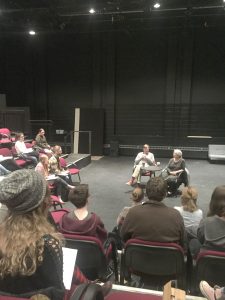Fairtytales with adult themes show not all stories have happy endings

The opening of Concordia theater’s sixth main stage production of the year, “The Secret in the Wings,” is just around the corner. Similar to the other productions, audiences will get to experience impressive acting, set designs, props, lighting, and costumes. However, one thing audiences will not be receiving is a happily-ever-after.
“Not all fairytales have happy endings,” said first-year student Abbi Cogdill, the sound designer for the production of “The Secret in the Wings.” “These fairy tales actually relate to the worst parts of life.”
“The Secret in the Wings” takes place in the familiar setting of a grand- mother’s basement, the place where things both go to be stored and rediscovered, allows the audience to experience the characters’ playing make-believe and dress-up. But despite the childlike activity happening on stage, the seven fairytales have adult themes such as the transition between girlhood and womanhood, and what it means to be a parent.
“So much of the core of our adulthood comes from how we were raised as children, and this play really hones in on that factor,” said Senior Ariel Johnson, the production’s stage manager.
“These are children stories being told by grownups and relating to grown-up issues,” Johnson said.
Concordia chose to perform “The Secret in the Wings” because of its unique take on fairy tales and storytelling. Dr. David Wintersteen, director of the play, said that Mary Zimmerman, a Tony-award winning playwright of the play, is an interesting playwright, because she bases her plays on collections of information rather than from personal experience. In addition to its unusual plot, “The Secret in the Wings” has important themes that audience members will be able to both relate to and take warning from.
“Disney has made us believe that fairy tales are sweet and light,” Wintersteen said. “But really, fairy tales are cautionary tales that ask ‘how do you live in the world’ and ‘what do you need to be afraid of?’”
To help answer these questions, the play recounts fairy tales in a theatrical way with the help of imagination, unique sound and lighting, and an abundance of props.
“The play shows the first half of the first fairy tale, the second half of the second fairy tale, and so on until the final fairy tale, which is told completely, and then goes back. We decided to signal different music for each fairy tale,” Cogdill said.
“Three Blind Queens,” “The Princess Who Wouldn’t Laugh,” “Allerleirauh,” and “Silent for Seven Years.” Zimmerman also wrote the plays being formed by NDSU and MSUM this theater season, “The Odyssey” and “Metamorphoses” respectively, and is scheduled to visit as well as lecture at each of the schools as part of “The Mary Zimmerman Festival.”
Ultimately, Wintersteen hopes for the audience to come away with these themes and reimagined stories fresh in their minds. “I think the images and ideas will stick around and will be part of conversations after the show, and perhaps will emerge as parents are interacting with children,” Wintersteen said.
Johnson urges audience members to come in with an open mind.
“It’s a really, really great show … and if you want to take away something from it you have to be willing to come in thinking ‘I’m going to see something new,’” Johnson said. “You have to be willing and open to trying new things.”
“The Secret in the Wings” opens on March 30 at 8 p.m., with performances also on March 31 and April 1 at 8 p.m., and April 2 at 2 p.m.
It is through the new take on the meaning of a fairy tale that the play is able to bridge the gap between childhood and adulthood.
The fairy tales in “The Secret in the Wings” are four lesser-known, European fairy tales that are featured in the play from Zimmerman, including
Tickets to the show are currently on-sale. Prices are $10 dollars for adults, and $5 dollars for seniors and non-Concordia students. The box office is open Tuesdays through Thursdays from 1 to 5 p.m., as well as onehour before all of the performances.

